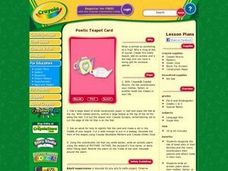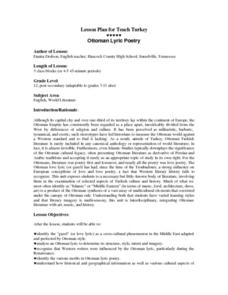Curated OER
Poetic Teapot Card
Learners recognize the role of loved ones in their families and the many things their parents and others contribute to their lives. They write an acrostic poem about their mother, father, or other important person. They then make a...
Curated OER
Cinquain Syllables
Students identify and analyze various forms of poetry, then use information gathered from research to write their own cinquain poems. They then identify each syllable of their cinquain with a small icon that reflects the theme of their...
Curated OER
Meter and Sonnets
In order to fully grasp the poetry of William Shakespeare, it's essential to study the sonnet and its meter and rhyme. Eight slides introduce basic terms like meter, foot, iamb, trochee, spondee, etc. Pair this presentation with a sonnet...
Curated OER
Lyric Poetry Lesson
Students synthesize the "textbook" definition of lyric poetry and discuss various forms (love lyric, complaint lyric, loss lyric, satiric lyric). They discover the relationship of poetry to musical selections.
Curated OER
Name Poem
In this name poem worksheet, students will read an example of an acrostic poem and complete a poem map to begin a rough draft of their own acrostic.
Curated OER
Spring Acrostic Poem
In this spring activity learning exercise, learners learn what an acrostic poem is, read an example, and then write their own acrostic poem about spring.
Curated OER
Acrostic Poems
Second graders listen to the book, SHARK WATCH as it is read to the class and name some of the facts they have learned about sharks from hearing the story. They then write an acrostic poem on the topic of sharks. Some of the students...
Curated OER
Acrostic Poems: What's In a Name?
Students find words that begin with the letters in their own names, using a variety of sources including word banks and online dictionaries. They create an acrostic poem. Pupils revise poems as needed, for meaning and conventions. ...
Curated OER
Snake Acrostic
In this acrostic poem worksheet, students write an acrostic poem describing a snake. Students write lines for the word slither which contains 7 letters.
Curated OER
A Poem About Sadako
In this poetry writing worksheet students use the letters SADAKO to write an acrostic poem. Each letter will begin the next line of poetry.
Curated OER
Hats acrostic poem
For this poetry worksheet, students write an acrostic poem about hats by beginning each line with a letter in the word "Hats."
Curated OER
Ottoman Lyric Poetry
Students explore the Ottoman style of poetry. They view a video, Suleyman the Magnificent, and view maps of Europe, Asia, Africa and the Mediterranean Sea. They research the Ottoman Empire and keep a journal. They read various Ottoman...
Curated OER
Volcano Acrostic
In this creative writing worksheet, students create an acrostic poem about volcanoes. Students use the letters in VOLCANOES to begin each line of poetry.
Curated OER
Basketball Acrostic Fill In the Blank Worksheet
In this poetry writing activity, students fill in the blanks to write a basketball acrostic poem. They begin each line with a word or phrase that starts with the letter on the line.
Curated OER
Happy Father's Day Acrostic Poem
In this language arts instructional activity, students use the letters in HAPPY FATHER'S DAY to begin each line of an acrostic poem about fathers.
Curated OER
My Father Acrostic Poem
In this language arts worksheet, learners use the letters in MY FATHER to begin each line of an acrostic poem about their own fathers.
Curated OER
July Acrostic Poem
In this language arts worksheet, students use the letters in the word JULY to begin each line of an acrostic poem about the month of July.
Curated OER
Soccer Acrostic Poem
For this language arts and sports worksheets, students use the letters in SOCCER to begin each line of an acrostic poem about soccer.
Curated OER
Writing Bug: a Friendly Poem
In this writing worksheet, students will write a poem about their best friend by using all of the letters in their first and last names.
Alabama Learning Exchange
Landforms Acrostic Poetry
Fourth graders apply scientific information about various landforms. They use the information to write and word process acrostic poems which they illustrate with clip art or pictures from magazines.
Curated OER
Poetry-The Essence of Life
Students analyze and appreciate various types of poetry. In this poetry unit, students read classic and contemporary works to discover ways in which poetry expresses strong feelings. Students identify key vocabulary used to analyze...
Great Schools
A Questionnaire: What Do You Like to Read?
What do your fifth graders know about types of fiction, nonfiction, and poetry? Find out as they fill out this questionnaire that requires them to list authors and texts that exemplify each genre. Not only will you be able to assess what...
Teacher's Corner
Haiku
The haiku, one of the most popular fixed forms, is the subject of this writing activity, the seventh in a series of ten poetry exercises.
Poetry4kids
Alliteration and Assonance Lesson Plan
Scholars analyze the poem My Puppy Punched Me in the Eye by Ken Nesbitt in order to locate examples of alliteration and assonance. After reading the poem, alliterative words are underlined and assonant words are circled.
Other popular searches
- Poetry Types
- Types of Poetry Powerpoint
- Different Types of Poetry
- 6 Types Lyric Poetry
- Identify Types of Poetry
- Word Search Types of Poetry
- Different Poetry Types
- Types Poetry Word Search
- Word Search: Types of Poetry
- Poetry Types Worksheet
- 2nd Grade Poetry Types
- Types of Poetry Worksheets

























